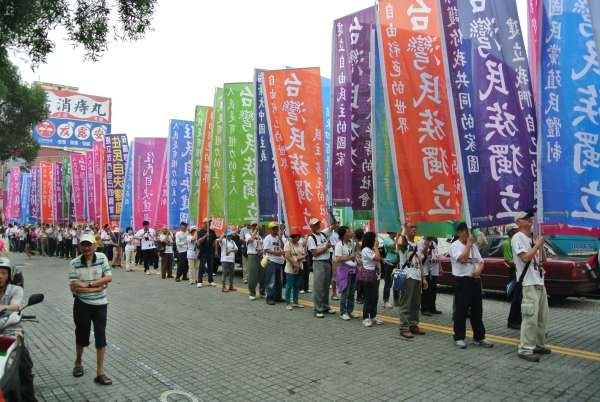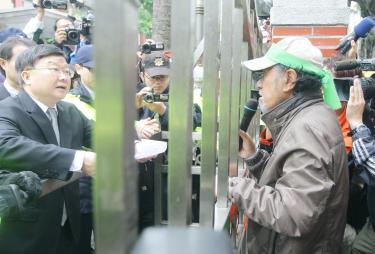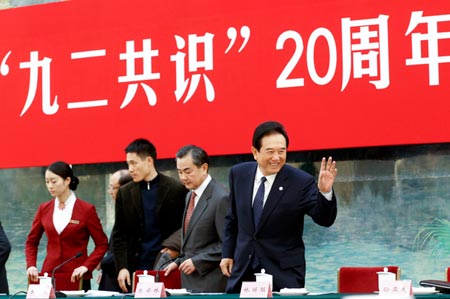by Parson Young
語言:
English
Photo Credit: Black Island Youth Liberation Front
THE MA ADMINISTRATION’S fortunately halted attempt to apply for membership of the China-led Asian Infrastructure Investment Bank (AIIB) once again inspired impromptu demonstrations this past month, instantly gathering over five hundred demonstrators in the middle of the night. As with the Cross Strait Service Trade Agreement (CSSTA) with China, the decision to apply for AIIB was done undemocratically and behind the backs of the population, and the Ma Administration was again surprised by their inability to escape the scrutiny of the Taiwanese people.
 Photo credit: Chialin/Taiwan Tati Cultural and Education Foundation
Photo credit: Chialin/Taiwan Tati Cultural and Education Foundation
Like the Sunflower Movement in 2014, criticisms against the AIIB membership bid ranges from a lack of transparency and due process, to the President’s suspiciously hasty enthusiasm for large-scale neoliberal economic policies. However, it is clear that China, with its explicit mission to conquer Taiwan, is the primary reason why majority of Taiwanese people staunchly oppose these legislations. Recent polls indicate that 60.4% of Taiwanese citizens do not consider themselves Chinese, and only 17.7% of the population wants Taiwan to be united with People’s Republic of China. The vision of Taiwan’s independence being achieved via reforming the Republic of China constitution and pushing for international statehood recognition is more popular than ever. While movement leaders like Lin Fei-fan and Chen Wei-ting all publicly support Taiwanese independence amidst thunderous applause, no one has yet proposed to a realizable program to make this dream a reality.
Taiwanese Independence as a Revolutionary Movement
THE TAIWANESE INDEPENDENCE movement, as we all know, has endured a long and bloody trial of history. From fighting the Japanese colonialists to combating the KMT imperialists, generations of Taiwanese activists have sacrificed their lives in order that the Taiwanese people may control their own destinies. Unfortunately, we often lose ourselves in remembrance of our predecessors’ heroism, and forget to think about what kind of Taiwan we want should we be truly independent.
First, we must admit that our country is a capitalist country within a world capitalist system. Our economy is dictated by the market. Within this market economy, the larger imperial powers such as the USA, Japan and China dominate the smaller countries. The only way to really have a say over our lives is to challenge this world economic system. In this, the working class in Taiwan must reach out to the workers throughout the world, in particular in the USA, Japan and China.
 The raising of the Japanese flag at Xinhua Public School (新化公學校) in 1924. Photo credit: taiwanese.tumblr.com
The raising of the Japanese flag at Xinhua Public School (新化公學校) in 1924. Photo credit: taiwanese.tumblr.com
The question of “how should the country function after independence,” may appear to be something to consider after independence, yet this vision necessarily informs the political revolutionary method. To provide several examples, Lenin, Trotsky, and the Bolsheviks had a clear program for a socialist Russia, which was to spread the revolution to Germany, France, China, and around the world. They organized themselves through establishing a solid support base among the Russian proletarians, who allowed them to achieved the impossible: ending centuries of Tsarism and establishing a regime that was on its way to genuine, democratic and participatory socialism until it was derailed by the rise of Stalinism after the death of Lenin. Stalin reversed the policies of Lenin which had provided for the highest expression of individual and social freedom in Russia up to that point in history—in fact, arguably to the present day. Nelson Mandela wanted a society of racial equality, and so was able to build a large coalition of anti-apartheid activists. Mandela even accepted white members into the African National Congress, to peacefully and fundamentally end apartheid in South Africa (although he failed to end the true root of the division within South Africa, which is the capitalist system, and today South Africa still suffers from even more acute economic inequality.)
Returning to the current state of Taiwanese independence movement, we find many groups with distinct programs all calling for de jure independence. They range from organizers of the anti-AIIB protest, who issued a press release with decidedly Marxist critiques against the new financial institution, to Taiwan Solidarity Union (TSU), who advocated for separate labor compensation standards for foreign workers in Taiwan. We also should not forget the sharpened anti-Waishengren sentiments instigated by the populist wing of the Democratic Progressive Party (DPP) during the Chen Administration, which fortunately subsided. In the Taiwanese context, nationalism appears to be embraced by both the radical left and the far right. Which one of these perspectives can lead to genuine independence for Taiwan?
Right nationalism is easy to reject on both cultural and economic grounds. Cultural/Ethnic nationalism not only is the definition of chauvinism (i.e. prejudice against others), but also makes no logical sense in a cosmopolitan, diverse country like Taiwan. It also makes no sense for economic conservatives to be pro-Taiwan independence, lest they delude themselves that they can profit from worsened dependence on US or Japan, or a utopian imagination that imperialist China that can be friendly with an independent Taiwan. Fortunately, right-wing nationalism in present-day Taiwan finds little audience: the Taiwanese people are too smart for that stuff.
Is Left Nationalism in Taiwan a Valid Solution?
As the bourgeois DPP, corrupted by their capitalist concerns, lessen their pro-Independence stance and bow to Xi Jinping, the voice of independence now most visibly comes from leftist student activists. Leading figures such as Lin Fei-fan and Chen Wei-ting and prominent groups such as Restoration of Taiwan Social Justice (臺左維新) have all advocated for de jure Taiwanese independence and general leftist policies. More impressively, they even employed Marxist terms, such as “capitalist over production,” “financial bourgeois class,” and so on to critique not just the AIIB, but existing international financial institutions in general. Here, we are witnessing a budding trend of correctly critiquing the global economic superstructure from the starting point of labor.
The problem with the present state of the Taiwanese left, like I mentioned before in my article concerning new political parties in Taiwan, is that there is still no concretely articulated program that can lead to Taiwan’s lasting independence. Vague calls for “transformational justice” and “decolonization” are habitually invoked without clear proposals for how these can be achieved. Groups such as Professor Tsay Ting-kui’s Referendum League calls for a referendum on the issue of de jure independence, and are sure that their goal can be achieved should a truly fair and just referendum be held. Nevertheless, despite the fact that referendum laws in Taiwan have some serious flaws that benefit the establishment, how can people like Professor Tsay be so sure that the referendum will come out in favor of independence, when the Taiwanese electorate has voted for a KMT presidency and legislature twice? People who want to achieve de jure independence via democratic means certainly have right on their side, but the reality is that the Taiwanese electorate is still aware of the irrationality of the Chinese government and the ever-present security threat it poses to the people of Taiwan. Activists like Professor Tsay’s choose to ignore that this fact presents a fatal flaw in their program.
 Tsay Ting-Kuei delivering a petition through the gates of the Legislative Yuan in April 2014. Photo credit: CNA
Tsay Ting-Kuei delivering a petition through the gates of the Legislative Yuan in April 2014. Photo credit: CNA
Unfortunately, the Referendum League is perhaps the closest to a concrete proposal of how de jure independence can be achieved. Most student activist groups at best call for a simple reform in the constitution and wishfully think that American imperialists will unconditionally back the idea, or at worst engage in overly academic/abstract discussion of generating “civil nationalistic sentiments” within Taiwan to make a majoritarian decision of de jure independence possible. None of these plans of action root themselves in material reality, but these somehow enjoy mainstream attention in the Taiwanese Left.
Taking a step backwards, one can see an even more disturbing picture: that the movement for independence is in effect on the defensive. The explosion of support for Taiwanese independence did not happen prior to Sunflower, but is rather a reaction to the hasty attempt to pass the CSSTA and to Xi Jinping’s repeatedly vocalized goal of “unifying” Taiwan and China. This is the reason why despite the ubiquity of pro-independence sentiments we see in Taiwan today, real political forces who claim to represent the Left, such as the DPP, are still distancing themselves from independence, and that no concrete programs have developed out of moralistic cries to date.
This situation reflects two realities that the Taiwanese Left needs to seriously confront. First is that it still lacks true political power in Taiwan within the existing bourgeois political system. Second is that there is no isolationist solution that leads to an independent Taiwan that is guaranteed to last.
So what is to be done?
Reformism is Hopeless, Socialist Revolution is the Only Way
THE CHIEF REASON why Taiwanese independence still resides in the margins of Taiwanese politics despite widespread support is because of Taiwan’s capitalist sociopolitical system. The KMT’s pro-capital stance to the point of selling out the country is honest and obvious, but the DPP is also slowly bowing to China’s monetary influence. This is because even the staunchest DPP bourgeois benefactors cannot resist the prospect of making millions from the Chinese. For example, two of the DPP’s biggest tycoon supporters, Everygreen Group chairman Chang Yung-fa and Far Eastern Group chariman Douglas Hsu(徐旭東), have both recently supported President Ma’s reemphasis of the 1992 Consensus, the KMT’s party-to-party agreement with the CCP on the “One China” Policy. This could hardly be surprising when Chang has publicly met with Chinese officials and committed to invest heavily in China, while Hsu also owns lucrative companies in China, such as Asia Cement. The capitalist system is intended to serve capital, not society. Therefore, with all the obfuscating “democratic” politics that Taiwan currently has, we see large transnational businesses like that of Terry Gou (郭台銘) being the most benefited. We can see this translates into our social values as well, such as the unfortunate prevalence of the phrase “democracy doesn’t feed you” (implying that only money does), is a popular trope in Taiwan. This author is uninterested in making ethical condemnations of this cultural trend, but merely wants to point out that a system designed to serve capital will only hear the voice of capital, and not the people. This is also not news to most Taiwanese or people all over the world. We all know that large private interests have an unchecked amount of influence over our politics and rarely relinquish their influences in service to communal interests, yet somehow everyone just accepts this as a fact of life.
If the Taiwanese Left truly wants to realize an independent, sovereign Taiwan, it must recognize that our current political establishment needs to be replaced by one that truly reflects the majoritarian opinion, rather than a system that is controlled by people who live in the Palace (帝寶). A Socialist Revolution is a concrete revolutionary method that can make this goal a reality. Socialist internationalism involves an unequivocal orientation to the most economically powerful and numerous class: the working class. In Taiwan, the working class not only produces all the wealth for society under their employment of the ruling class, but also constitute over 55% of the labor force in private sector alone. Anyone who claims to be a Leftist has to recognize the enormous potentiality as well as the extreme exploitation that the Taiwanese working class faces everyday. A true Leftist should be an advocate of the workers, and explain to them clearly why Taiwanese Independence on a socialist basis is not only morally just, but also beneficial for the workers, as it will prevent them from being exploited by both the Chinese and the Taiwanese capitalists. Thus, a socialist revolution will lead to a truly democratic society that carries out the majority’s wishes: Taiwanese independence.
A second advantage of a socialist revolution as a mean to achieve Taiwanese independence is that it will take Taiwan out of international obscurity and inspire Leftist movements all over the world. At present, the world mainstream media woefully underreports Taiwan despite the integral role Taiwan plays in world economy. Taiwan’s status as a de facto state is often portrayed by Chinese-led media effort as a minority separatist movement. This is why the majority of the world’s governments do not and will not support an independent Taiwan. A successful worker-based socialist revolution will put Taiwan at the frontline of every labor-based news media, to show workers all over the world that the workers in Taiwan have successfully broke from their chains, which will certainly garner the attention of workers worldwide, giving Taiwan the popular support it never enjoyed. A successful socialist revolution in Taiwan would also inspire the much-oppressed Chinese proletarians, and inspire them to rebel against the brutal wage slavery the so-called Chinese Communist Party has put them under. A socialist revolution is an effective way for Taiwan to reach out to the world.
It is important to remember that socialism cannot be built in one country alone, especially one the size of Taiwan. The workers taking power in Taiwan would be a signal for worker everywhere that a different society is possible. Chinese workers and workers throughout Asia and the world would look to a workers’ republic as an example to follow and link up with.
Finally, only a socialist system can successfully safeguard the democracy from the influence of capital. The DPP’s softening stance on Taiwanese independence is unfortunately inevitable, due to the fact that their primary constituents are not the workers, but the Taiwanese bourgeoisies who happen to dislike the KMT. Should a working class revolution succeed, the entire political structure will no longer be swayed by the influence of capital. A living example of our time is Venezuela. Hugo Chavez, until his death in 2013, was able to nationalize significant sectors of the economy and used this wealth to vastly improve the country’s infrastructure and education system. He went even further, and instead of placing the nationalized industries under the control of bureaucrats, he placed them under workers’ control.
 Conference concerning the 20th anniversary of the “1992 Consensus.” Photo credit: CNS
Conference concerning the 20th anniversary of the “1992 Consensus.” Photo credit: CNS
To be sure, the Venezuelan Revolution achieved much and is an inspiration, but it was not completed. More than 60% of the economy is still in the hands of the capitalists who constantly sabotage the government. Also, the bourgeois state apparatus has not been dismantled and replaced with workers’ councils; this has also allowed the capitalists to create chaos and threaten the revolution. Hence, country’s media is still controlled by the capitalists, and there have been a number of attempts via both elections and coups to overthrow the government. But despite all this, Venezuela’s population continues to come out and support the Chavista program every time there is an attempt to thwart it. Of course, we cannot forget to criticize Chavez government’s inability to control spontaneous violence and local level law enforcement corruption, but the resilience of the system in Venezuela in face of threats from the Venezuelan conservatives and US imperialism is a testament to the strength of the Venezuelan Revolution fueled by the working masses themselves. If the Taiwanese people truly want de jure independence, it necessarily needs a political system that is not easily seduced by Chinese capital. Socialism is the only kind of democracy where this is possible.
The story of Taiwan is a history of being trampled under imperialism, colonialism, and military dictatorship. The Taiwanese people, while resiliently surviving, are forced to suffer in silence. If the working people of Taiwan really want to be the masters of their own fate, they necessarily need to replace this façade of a democracy, in which a handful of people make all the decisions, with a truly majoritarian one. The clock is ticking and the Chinese imperialists are advancing once again. It is time for the workers of Taiwan to rise up against imperialism and capitalism in all its guises.





